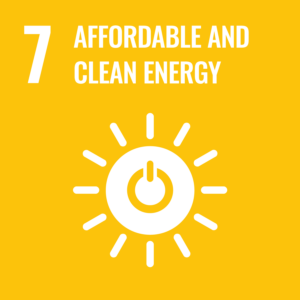
Tourism is energy-intensive and as a sector can also be a source of environmental damage, especially when reliant on scarce resources like fossil fuels. By promoting investment in clean energy sources, tourism can help to reduce greenhouse gas emissions, mitigate climate change and contribute to access to energy for all. The implementation of renewables in a local community can start in the tourism sector, for example, ocean energy in Small Island Developing States (SIDS).
Paying particular attention to the potential growth of developing countries, tourism stakeholders should prioritize energy efficiency across operations and whenever possible aim to source operational electricity needs from renewable sources.
There are three targets within SDG 7 that are deemed have a closer link for tourism to help ensure access tpoaffordable, reliable, sustainable and modern energy for all. These targets have been selected to base the potential project indicators.
TARGET 7.2
BY 2030, INCREASE SUBSTANTIALLY THE SHARE OF RENEWABLE ENERGY IN THE GLOBAL ENERGY MIX.
Using renewable energy sources can significantly decrease the environmental footprint of tourism and production of energy will help businesses cope with the fluctuation of fuel supply and protect them from price inflation or shortage of fuels, making renewable energy a case for economic sustainability. Commitment to the use of renewable energy sources within the destination and the tourism sector, including self-production of energy, procurement of green energy, passive designs. in construction, as well as proactive regulatory frameworks and incentives can accelerate the shift towards renewable energy, helping to achieve this target.
Various parts of the tourism sector can have different approaches to change their energy sources. For example, the use of electric vehicles instead of conventional transportation, the use of air conditioning and boilers powered by solar and other renewable energy sources.
Potential indicators in this target are grouped by the following Theme and sub-theme:
Natural resource management / Renewable energy
Infrastructure / Energy efficient installations
Legal framework, policies and rule of law / Tourism policies and strategies
Education and training / Capacity building
TARGET 7.3
BY 2030, DOUBLE THE GLOBAL RATE OF IMPROVEMENT IN ENERGY EFFICIENCY.
Significant levels of energy are consumed by the tourism sector both through fixed assets (buildings, etc.) andmobile assets (motor vehicles, trains, ferries, etc.). A reduction in energy consumed will have a positive impact on the operational costs of enterprises (and can reduce pressure on utilities) and have major environmental benefits, primarily through reducing consumption of natural resources and lowering associated greenhouse gas emissions and thus contributing to Target 7.3.
The availability of certifications and the use of ecolabels can help private sector actors, including tourism stakeholders, integrate a systematic management towards resource efficiency and overtly display their actions (e.g., Lead in Energy and Environmental Design (LEED) and Green Key). Green Key suggests that
certified establishments undergo independent and
external energy audits every five years (criterion 7.19).
Green Key also offers a free calculation tool on its website to help tourism establishments measure their carbon footprint. Various tools exist to assist accommodation managers with energy benchmarking, most notably the free Hotel Energy Solutions (HES) “e-toolkit” or Nearly Zero Energy Hotels (neZEH)
Potential indicators in this target are grouped by the following Theme and sub-theme:
Natural resource management / Environment management system/plan
Infrastructure / Energy efficient installations
Education and training / Awareness raising
TARGET 7.b
BY 2030, EXPAND INFRASTRUCTURE AND UPGRADE TECHNOLOGY FOR SUPPLYING MODERN AND SUSTAINABLE ENERGY SERVICES FOR ALL IN DEVELOPING COUNTRIES, IN PARTICULAR LEAST DEVELOPED COUNTRIES, SMALL ISLAND DEVELOPING STATES, AND LAND-LOCKED DEVELOPING COUNTRIES, IN ACCORDANCE WITH THEIR RESPECTIVE PROGRAMMES OF SUPPORT.
Affordable and sustainable energy is essential for a thriving tourism sector especially in countries whose energy costs are often elevated due to dependency on imported or expensive fossil fuels, which also makes them vulnerable to disruptions. Energy access is a major development constraint in many developing countries and, while starting from a relatively low base, energy demand is expected to grow very rapidly in many of these countries in the future. Small Island Developing States (SIDS) and also other developing countries including least developed countries (LDCs) and landlocked developing countries (LLDCs) are highly dependent on fossil fuels. This target calls for suitable programmes of support for developing countries, in particular LDCs, SIDS and LLDCs to access appropriate technologies and expertise to meet their future energy needs.
Accelerating the use of renewable energy by the tourism sector in these countries requires concerted actions and efforts to support the business case for such changes. The promotion of sustainable energy solutions can attract future investment and encourage tourists, for example, to stay in hotels that provide such solutions, demonstrating the business case worldwide.
Potential indicators in this target are grouped by the following Theme and sub-theme:
Local community / Local community participation
Financing / Access to finance
Education and training / Capacity building
Natural resource management / Environment management system/plan

